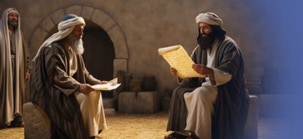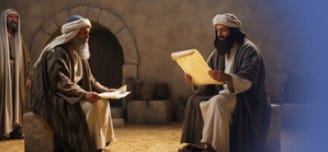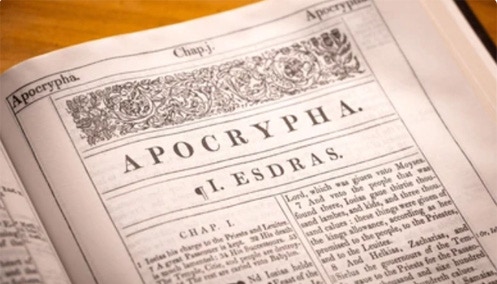


Common Objections
Common Objections
Catholic Outlook
Catholic Outlook

Catholic Outlook
Common Objections
Common Objections
__________ Recent Additions __________
Catholic Outlook
Catholic Outlook
__________ The “Apocrypha” __________
“No apocryphal book is referred to in the New Testament, whereas the Old Testament is referred to hundreds of times.”
Gary Hoge

For some reason, those who repeat this objection assume that if a book is not quoted in the New Testament, it must not be inspired. Protestant author Josh McDowell wrote,
The New Testament writers may allude to the apocrypha, but they never quote from it as holy Scripture or give the slightest hint that any of the books are inspired. If the Septuagint in the first century contained these books, which is by no means a proven fact, Jesus and His disciples completely ignored them.1
True, but they also “completely ignored” Judges, 1 Chronicles, Esther, Ruth, Ecclesiastes, Song of Songs, Ezra, Lamentations, Nehemiah, Obadiah, Nahum, and Zephaniah. The New Testament writers never quote these as holy Scripture or give the slightest hint that any of them are inspired. So if their failure to quote from the deuterocanonical books indicates that those books are not inspired, then neither are these.
Further torpedoing the “quotation equals canonicity” argument is the fact that the New Testament authors not only completely ignored some inspired writings, but they also quoted from some non-inspired writings. For example, Jude quoted from the book of Enoch (Jude 14, 15), and referred to the Assumption of Moses (Jude 9). The Ascension of Isaiah is alluded to in Hebrews 11:37. Paul quoted from the Cretan poet Epimenides (Acts 17:28; Tit. 1:12), and from the Cilician poet Aratus (Acts 17:28), and from the Athenian poet Menander (1 Cor. 15:33). Even Jesus himself quoted from the play Agamemnon, by Aeschylus, in Acts 26:14. It should be obvious, then, that quotation, or non-quotation, is irrelevant to the issue of inspiration.
However, although the New Testament writers did not directly quote from the deuterocanonical books, it is not true that they never referred to any of them. For example, when Paul writes,
Or does not the potter have a right over the clay, to make from the same lump one vessel for honorable use, and another for common use? (Romans 9:21).
he may very well be referring to this passage from the book of Wisdom:
A potter kneads the soft earth and laboriously molds each vessel for our service, fashioning out of the same clay both the vessels that serve clean uses and those for contrary uses, making all alike (Wisdom 15:7).
Or, when Paul writes,
No, but I say that the things which the Gentiles sacrifice, they sacrifice to demons, and not to God; and I do not want you to become sharers in demons (1 Corinthians 10:20).
he could be referring to this passage:
For you provoked the one who made you by sacrificing to demons and not to God (Baruch 4:7).
In the book of Hebrews, we are told that “by faith Enoch was taken up so that he should not see death; and he was not found because God took him up; for he obtained the witness that before his being taken up he was pleasing to God” (Hebrews 11:5). Where is this “witness” that Enoch was pleasing to God? The entire Genesis account of the life of Enoch is this:
And Enoch lived sixty-five years, and became the father of Methuselah. Then Enoch walked with God three hundred years after he became the father of Methuselah, and he had other sons and daughters. So all the days of Enoch were three hundred and sixty-five years. And Enoch walked with God; and he was not, for God took him (Genesis 5:21-24).
We are not told here why God took Enoch. The Scriptural “witness” that Enoch was “pleasing to God” is not found here, it is found in the book of Sirach:
Enoch pleased the Lord and was taken up, an example of repentance to all generations (Sirach 44:16).
When Jesus said,
“Do not lay up for yourselves treasures upon earth, where moth and rust destroy, and where thieves break in and steal. But lay up for yourselves treasures in heaven, where neither moth nor rust destroys, and where thieves do not break in or steal” (Matthew 6:19-20, NASB).
I wonder if he had in mind this passage from Sirach:
Lose your silver for the sake of a brother or a friend, and do not let it rust under a stone and be lost. Lay up your treasure according to the commands of the Most High, and it will profit you more than gold (Sirach 29:10-11).
But I think the clearest reference to the deuterocanonical books is found in the book of Hebrews. In chapter 11, verse 35, we read, “Women received back their dead, raised to life again. Others were tortured and refused to be released, so that they might gain a better resurrection.” The first part of the verse is an obvious reference to the story of Elijah raising the widow’s son from the dead in 1 Kings 17. But who were these people who were tortured and refused to be released, so that they might gain a better resurrection? Well, you can read the entire Protestant Old Testament, from Genesis to Malachi, but you won’t find them. Their story is found in the book of 2 Maccabees, chapter 7, where we read:
1 It also happened that seven brothers with their mother were arrested and tortured with whips and scourges by the king, to force them to eat pork in violation of God’s law.
2 One of the brothers, speaking for the others, said: “What do you expect to achieve by questioning us? We are ready to die rather than transgress the laws of our ancestors.”
3 At that the king, in a fury, gave orders to have pans and caldrons heated.
4 While they were being quickly heated, he commanded his executioners to cut out the tongue of the one who had spoken for the others, to scalp him and cut off his hands and feet, while the rest of his brothers and his mother looked on.
5 When he was completely maimed but still breathing, the king ordered them to carry him to the fire and fry him. As a cloud of smoke spread from the pan, the brothers and their mother encouraged one another to die bravely, saying such words as these:
6 “The Lord God is looking on, and he truly has compassion on us, as Moses declared in his canticle, when he protested openly with the words, ‘And he will have pity on his servants.’”
7 When the first brother had died in this manner, they brought the second to be made sport of. After tearing off the skin and hair of his head, they asked him, “Will you eat the pork rather than have your body tortured limb by limb?”
8 Answering in the language of his forefathers, he said, “Never!” So he too in turn suffered the same tortures as the first.
9 At the point of death he said: “You accursed fiend, you are depriving us of this present life, but the King of the world will raise us up to live again forever. It is for his laws that we are dying.”
10 After him the third suffered their cruel sport. He put out his tongue at once when told to do so, and bravely held out his hands,
11 as he spoke these noble words: “It was from Heaven that I received these; for the sake of his laws I disdain them; from him I hope to receive them again.”
12 Even the king and his attendants marveled at the young man’s courage, because he regarded his sufferings as nothing.
13 After he had died, they tortured and maltreated the fourth brother in the same way.
14 When he was near death, he said, “It is my choice to die at the hands of men with the God-given hope of being restored to life by him; but for you, there will be no resurrection to life.”
15 They next brought forward the fifth brother and maltreated him. Looking at the king,
16 he said: “Since you have power among men, mortal though you are, do what you please. But do not think that our nation is forsaken by God.
17 Only wait, and you will see how his great power will torment you and your descendants.”
18 After him they brought the sixth brother. When he was about to die, he said: “Have no vain illusions. We suffer these things on our own account, because we have sinned against our God; that is why such astonishing things have happened to us.
19 Do not think, then, that you will go unpunished for having dared to fight against God.”
20 Most admirable and worthy of everlasting remembrance was the mother, who saw her seven sons perish in a single day, yet bore it courageously because of her hope in the Lord.
21 Filled with a noble spirit that stirred her womanly heart with manly courage, she exhorted each of them in the language of their forefathers with these words:
22 “I do not know how you came into existence in my womb; it was not I who gave you the breath of life, nor was it I who set in order the elements of which each of you is composed.
23 Therefore, since it is the Creator of the universe who shapes each man’s beginning, as he brings about the origin of everything, he, in his mercy, will give you back both breath and life, because you now disregard yourselves for the sake of his law.”
24 Antiochus, suspecting insult in her words, thought he was being ridiculed. As the youngest brother was still alive, the king appealed to him, not with mere words, but with promises on oath, to make him rich and happy if he would abandon his ancestral customs: he would make him his Friend and entrust him with high office.
25 When the youth paid no attention to him at all, the king appealed to the mother, urging her to advise her boy to save his life.
26 After he had urged her for a long time, she went through the motions of persuading her son.
27 In derision of the cruel tyrant, she leaned over close to her son and said in their native language: “Son, have pity on me, who carried you in my womb for nine months, nursed you for three years, brought you up, educated and supported you to your present age.
28 I beg you, child, to look at the heavens and the earth and see all that is in them; then you will know that God did not make them out of existing things; and in the same way the human race came into existence.
29 Do not be afraid of this executioner, but be worthy of your brothers and accept death, so that in the time of mercy I may receive you again with them.”
30 She had scarcely finished speaking when the youth said: “What are you waiting for? I will not obey the king’s command. I obey the command of the law given to our forefathers through Moses.
31 But you, who have contrived every kind of affliction for the Hebrews, will not escape the hands of God.
32 We, indeed, are suffering because of our sins.
33 Though our living Lord treats us harshly for a little while to correct us with chastisements, he will again be reconciled with his servants.
34 But you, wretch, vilest of all men! do not, in your insolence, concern yourself with unfounded hopes, as you raise your hand against the children of Heaven.
35 You have not yet escaped the judgment of the almighty and all-seeing God.
36 My brothers, after enduring brief pain, have drunk of never-failing life, under God’s covenant, but you, by the judgment of God, shall receive just punishments for your arrogance.
37 Like my brothers, I offer up my body and my life for our ancestral laws, imploring God to show mercy soon to our nation, and by afflictions and blows to make you confess that he alone is God.
38 Through me and my brothers, may there be an end to the wrath of the Almighty that has justly fallen on our whole nation.”
39 At that, the king became enraged and treated him even worse than the others, since he bitterly resented the boy’s contempt.
40 Thus he too died undefiled, putting all his trust in the Lord.
41 The mother was last to die, after her sons (2 Maccabees 7:1-41).
These brothers and their mother were tortured to death, one by one. But they all stood firm because they had their eyes fixed on the resurrection of the just. They are the ones about whom the inspired author says, “[they] were tortured and refused to be released, so that they might gain a better resurrection.” And that isn’t just my opinion, as the following three Protestant sources confirm:
They bore the torture, and would not accept of deliverance upon such vile terms; and that which animated them thus to suffer was the hope they had of obtaining a better resurrection, and deliverance upon more honourable terms. This is thought to refer to that memorable story, 2 Macc. ch. 7, etc.2
It is quite likely that the background for much of this concluding summary comes from 2 Mac. 6:18-7:42. The writer considers the men and women mentioned there to rank with Gideon, Barak, Samson, David, etc., in witnessing to the meaning of faith.3
Heb. 10:35 is no doubt an echo of [2 Macc.] 6:18-7:42 and shows that the unknown author of Hebrews had 2 Maccabees before him.4
Consider also the fact that Jesus and the disciples celebrated the feast of Hanukkah (John 10:22, 34-36). The significance of this is explained by Mark Shea:
[T]he divine establishment of this key feast day is recorded only in the deuterocanonical books of 1 and 2 Maccabees. It is nowhere discussed in any other book of the Old Testament. In light of this, consider the importance of Christ’s words on the occasion of this feast: “Is it not written in your Law, ‘I have said you are gods’? If he called them ‘gods,’ to whom the word of God came — and the Scripture cannot be broken — what about the One whom the Father set apart as His very own and sent into the world?” Jesus, standing near the Temple during the feast of Hanukkah, speaks of His being “set apart,” just as Judas Maccabeus “set apart” (i.e., consecrated) the Temple in 1 Maccabees 4:36-59 and 2 Maccabees 10:1-8. In other words, our Lord made a connection that was unmistakable to His Jewish hearers by treating the Feast of Hanukkah and the account of it in the books of the Maccabees as an image or type of His own consecration by the Father. That is, He treats the Feast of Hanukkah from the so-called “apocryphal” books of 1 and 2 Maccabees exactly as He treats accounts of the manna (John 6:32-33; Exodus 16:4), the Bronze Serpent (John 3:14; Numbers 21:4-9), and Jacob’s Ladder (John 1:51; Genesis 28:12) — as inspired, prophetic, scriptural images of Himself.5
__________
1 Josh McDowell and Don Stewart, Answers to Tough Questions Skeptics Ask About the Christian Faith, (San Bernardino, CA: Here’s Life Publishers, Inc., 1980), 36-37.
2 Matthew Henry’s Commentary.
3 Gerald F. Hawthorne, “Hebrews,” International Bible Commentary, ed. F.F. Bruce, (Grand Rapids, MI: Zondervan Publishing House, 1986), 1528.
4 International Standard Bible Encyclopedia, 1915.
5 Mark Shea, “5 Myths about 7 Books,” Envoy Magazine, March/April, 1997.
Copyright © 2024 Catholicoutlook.me
MENU